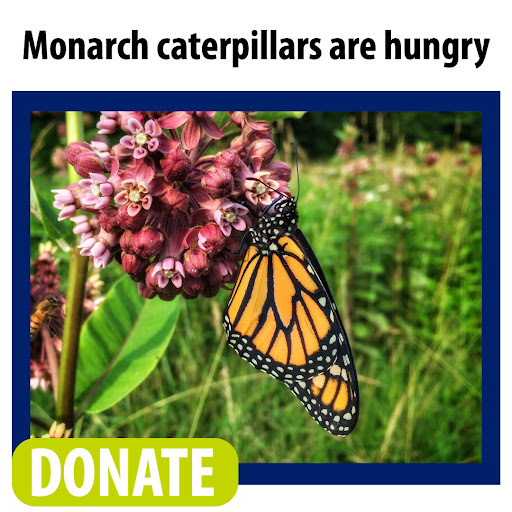

 |
It's a sad time to be a monarch butterfly, John.
Monarch caterpillars are running out of food. Milkweed is getting harder and harder for them to find, and it's their only source of food.
We need to end the habitat loss and overuse of pesticides that is leaving monarchs with nothing to eat.
Monarch caterpillars are starving. Will you donate?
Monarch caterpillars' only food is milkweed, which is rapidly disappearing across America.
Toxic pesticides are one factor contributing to the decline of milkweed. Glyphosate is the main ingredient in Roundup and it destroys monarchs' food. As the use of Roundup soared, milkweed plummeted.1
Without milkweed, monarch moms struggle to find a place to lay their eggs. And when monarch caterpillars hatch, they go hungry.2
When monarchs grow up and take flight, they have a long migration ahead of them. But it's impossible to make that journey when a butterfly is running on empty.
We need to help milkweed rebound, and in turn, we can help starving monarchs get enough food to survive.
Here's how we're going to save the monarchs:
- To bring milkweed back, we're calling on decision-makers to increase pollinator-friendly habitat and plant more native milkweed.
- We're working to end the use of glyphosate -- the main ingredient in Roundup -- which has decimated plants that monarchs depend on. We also are campaigning to end the worst uses of other toxic pesticides that hurt monarchs, bees and birds.
- Environment Colorado is also calling on Interior Secretary Deb Haaland to protect monarchs under the Endangered Species Act.
Together, we can do what it takes to win -- but our campaigns take resources, and we can't do it without you, John.
Will you donate to help save starving monarchs?
Thank you,
Ellen Montgomery
1. Jeff McMahon, "Monarch butterflies suffered one blow from glyphosate, then another from climate change," Forbes, December 27, 2022.
2. "Milkweed and Monarchs," National Park Service, last accessed August 4, 2023.
Your donation will be used to support all of our campaigns to protect the environment, from saving the bees and protecting public lands, to standing up for clean water and fighting climate change. None of our work would be possible without supporters like you. Environment Colorado may transfer up to $50 per dues-paying member per year into the Environment Colorado Small Donor Committee.
Environment Colorado, Inc.
1543 Wazee St., Suite 400, Denver, CO 80202, (303) 573-3871
Member questions or requests call 1-800-401-6511.
Facebook | Twitter
If you want us to stop sending you e-mail then follow this link -- Unsubscribe